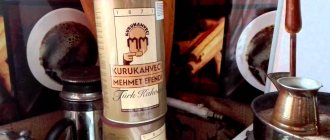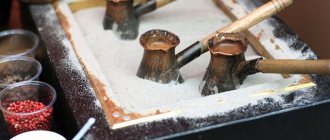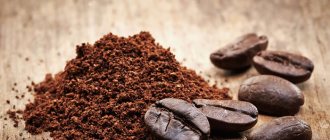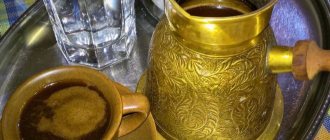Does coffee grow in Turkey?
The Republic of Turkey is not among the countries that grow coffee trees. Nevertheless, this drink (along with tea) is so popular in the country that it is considered part of the national culture, an indispensable attribute of special events, business meetings and family feasts.
Local supply companies offer a wide selection of different types of drink.
The first place is occupied by Turkish coffee beans, which are brewed in a traditional cezve with the addition of:
- cognac;
- nuts;
- spices;
- honey;
- fruit juice.
The drink first appeared in the Ottoman Empire in the 16th century.
There are different versions about this event:
- The fruits of the coffee tree were brought to Turkey by Syrian travelers.
- The drink was first served to Suleiman the Magnificent, who paid a visit to Yemen, which at that time was part of the huge Ottoman state.
In the first years after its appearance in the country, coffee was considered a privilege of the nobility. Later, the “invigorating elixir” began to spread throughout society, winning the love of the local population.
The Turkish climate is not entirely suitable for growing coffee trees. Historically, raw materials were imported from Arab countries. Now coffee beans are an important import item for the country. The Republic of Turkey has entered into agreements for the supply of raw materials with many global manufacturers.
Turkish coffee culture
Coffee in Turkey plays an important social role - it is more often drunk in special establishments than at home, and usually in company rather than alone. Coffee is always served at all significant holidays, events and ceremonies.
A Turkish proverb says: “The memory of a cup of coffee lasts 40 years.”
In Turkey, they really like to tell fortunes on coffee grounds: when the invigorating drink comes to an end, they turn the cup with the sediment upside down and see what shapes can be discerned in the drips on the walls.
What types of coffee are there in Turkey?
Coffee products in Turkey can be found in every supermarket. In all cities of the country there are stores specializing in the sale of this product.
The main rule for preparing real Turkish coffee is to use Arabica beans, finely ground and moderately roasted. Coffee can be bought in Turkey almost on every corner: in small shops, large supermarkets and in specialized shops. On the shelves there are options from the strongest to caffeine-free mixtures, as well as with various flavoring additives.
Turks also pay attention to other types of coffee:
- Soluble . It is represented by a variety of brands, the most popular of which are “Jacobs” and “Nescafe”. The drink made from such raw materials is not strong. Many people call it “female” or “childish”.
- Ground coffee almost ready for brewing. The grains do not need to be crushed; it is enough to prepare the drink in a traditional cezve.
- Ottoman coffee stands out in a separate group. When brewing a hot drink, milk, sugar, and aromatic spices are added.
Be sure to read: Powdered Turkish tea: what varieties are there, composition, how to brew, preparation features
How the recipe came about
The history of this recipe does not begin in Turkey. Caravan workers in North America and Asia were the first to brew coffee using this technology. To deliver the cargo, they had to move through deserts and mountains for several months. Wanting to replenish their strength, they brewed coffee beans. They prepared the drink on hot sand near the fire, periodically moving the container closer to the fire to maintain the desired temperature.
After a while, the Turks learned about this recipe. It gained immense popularity in the East, and soon Turkish coffee became famous throughout the world.
Turkish coffee: popular brands
The country's climate is not suitable for growing coffee plants. Despite this, there is a wide range of coffee on supermarket shelves. There are various types on sale, but coffee beans remain the favorite.
| brand | description |
| Kurukahveci Mehmet Efendi | The company began operating in the 19th century. Now the factories use the latest developments and technologies. Many years of production experience are also taken into account. Mehmet Efendi produces products from finely ground beans, which produce strong aromatic coffee. A package weighing 100 g will cost 5-6 liras (or 55-65 rubles). |
| Hisar Kahve 1928 | The corporation, founded in the first half of the 20th century, produces coffee products using modern equipment. The use of the latest technological developments in production, combined with the experience accumulated over a century of operation of the company, helps to produce high-quality products. The price of the product (per 100 g) is 5-7 liras. This is 55-78 rubles. |
| Cezbeli Kahve | The company is based in Istanbul. Produces instant coffee. Selected Arabica beans are used for production. A package weighing 100 g costs 5 liras (55-58 Russian rubles). |
| Kahve Dunya Türk Kahvesi | A manufacturer operating in the Turkish coffee market since 2004. It supplies ground and instant coffee to stores across the country, and also exports goods to foreign countries (Kuwait, Saudi Arabia, Romania). 100 g of raw materials costs from 5 to 7 liras (from 55 to 78 rubles). |
| Ulker Cafe Grown | The Ülker company, traditionally engaged in the production of chocolate products, produces different types of instant coffee:
The cost is 50 kurus per bag (portioned). Translated into Russian money, this is 5-6 rubles. |
| Nurettin Kocatepe Türk Kahvesi | The Kocatepe company began operations in 1948. The company produces coffee beans. The raw materials are characterized by a high degree of roasting. However, this does not affect the taste of the finished drink, which remains soft, without the slightest sign of bitterness. 100 g of raw materials costs 6-7 Turkish liras (66-78 rubles). |
Ozerlat
Ozerlat Mosaic Coffee
Founded on the island of Cyprus in 1917 by Dervis "Tahmis" Ozerlath, this family business has been in business for almost a century. He earned the nickname by being the first to introduce Turkish coffee to the island. tahmis meaning 'coffee roaster', in Greek
Özerlat sticks to its traditional methods of roasting and grinding 100% Arabica beans, which were recently launched in the UK. Their packaging certainly reflects the quality of their coffee. Ozerlat is definitely one of the best Turkish coffee brands we have come across.
Their special mosaic is worth trying for a whole new Turkish coffee experience, as noted on their website;
Beneath the luscious cream, Mosaic offers gorgeous aromas of toasted nuts and red berries, with a buttery smooth palate showing nutty, cranberry and tangy citrus notes.
Turkish coffee beans: which one is better?
Turkish manufacturing enterprises supply the local market with a wide range of products containing Robusta or Arabica beans. Arabica is in greatest demand in Turkey. It is believed that a drink made from Arabica beans tastes better and also has a brighter aroma.
When purchasing products, you need to pay attention to the labels on the packaging. The percentage of raw material quality (100% Arabica) must be indicated there. According to the Turks, only from such a product can a real aromatic “elixir” be prepared.
The country of origin of the grains is also important. Products grown in Brazil are in demand. In addition, such products have a relatively low cost.
Interesting Facts
- Nowhere in the world do coffee shops play such a significant role as in Turkey. It is interesting that they are still predominantly attended by only men, and women prefer to visit each other.
- Turks sweeten their coffee at the preparation stage, adding sugar directly to the cezve, and never to the cup.
- In 2013, Turkish coffee was included in the UNESCO World Heritage List.
- The type of coffee does not matter - Turks readily drink both Arabica and Robusta or their blends. The main thing is that the grains are ground as finely as possible and boiled in a cezve.
- Despite the fact that “Turkish coffee” has already become a household name and is deeply integrated into the culture of the country, the Turks themselves still drink tea more often.
Author of the article: Diana Koltsova
barista and coffee lover rolled into one
Your mark:
What is the best ground coffee in Turkey?
Modern Turks often buy freeze-dried coffee. Despite this, ground coffee ranks first in the list of sales leaders.
Brands sold include:
- Kurukahveci Mehmet Efendi;
- Abdullah Efendi Türk Kahvesi;
- Orta Kavrulmuş Türk Kahvesi.
“Mehmet Efendi” is in first place in sales. This product is purchased by Turks to prepare treats at home. Tourists do not ignore the popular brand either, purchasing the product and bringing it back home as a souvenir.
How to drink coffee correctly
To fully reveal the taste of oriental coffee prepared on sand, take a sip of cold water before drinking it. Only after this do they start drinking coffee.
The drink is not drunk immediately after being poured into cups. It is still too hot and can burn your lips. Be sure to wait a couple of minutes. Consumption should be leisurely. Take small sips, hold the cup in your right hand with your index finger and thumb.
Brewing coffee beans on sand is a real art, but any coffee lover can master it. The main thing is to accurately study the cooking technology and take a responsible approach to all actions. Then you will certainly be able to achieve the desired result and fully enjoy the exquisite taste of the Turkish drink.
Charalambus gold
Charalambous Coffee roasters in Nicosia, Cyprus.
This Greek coffee is absolutely exceptional with its rich aroma and smoothness. In the early days, the founder, Mr. George Haralambous, used bicycles to deliver fresh ground coffee to nearby cafes. The oldest roaster in Cyprus, established in 1943, Charalambous has made a name for itself both on the small Mediterranean island and abroad, home to a dense population of Turkish, Cypriot and Greek expats.
There are many Turkish people who prefer hot Haralambian gold compared to Mehmet Efendi. Along with Nuri Toplar, Charalambous is much less bitter and full of flavor.
So, this is the first part of our Search for the best Turkish coffee brands.
Did we miss your favorite Turkish coffee brand? Or do you have some tips for us? Share them below in the comments.
Coffee and health
- Coffee contains caffeine up to 1500 mg/l. Purine alkaloids (caffeine, theobromine and theophylline), when systematically consumed at a level of 1000 mg per day, cause a person to constantly need them, reminiscent of alcohol addiction [4].
- Coffee has a strong diuretic (diuretic) effect[5][6]. When drinking coffee, it is advisable to compensate for fluid loss.
Coffee can cause an increase in blood pressure of approximately 10 mm Hg. Art., in people who do not use it often [7], [8], [9]. Chronic coffee consumption does not increase blood pressure in most people [10],[11][12], but there is evidence that in some people, coffee may cause a small but persistent increase in blood pressure.[13] Most studies have not shown an association of coronary heart disease with coffee consumption[14][15][16]. Unfiltered coffee can cause an increase in total cholesterol in the blood plasma[17][18]. Coffee affects the functioning of the central nervous system, and the acute and chronic phases of action can be clearly divided [19]. Coffee improves attention, improves the ability to concentrate, especially when a person is tired[20][21]. One cup of coffee improves attention, productivity, memory and mood.[22]. Caffeine is effective for migraine headaches[23] and can reduce the risk of developing Parkinson's[24] and Alzheimer's[25][26]. Chronic coffee consumption can improve insulin sensitivity[27], and reduce the risk of developing type 2 diabetes[28],[29],[30][31],[32]. Drinking coffee slightly reduces the incidence of constipation [33]. Coffee significantly reduces the risk of developing liver cirrhosis[34]. There is evidence that coffee may reduce the risk of breast cancer in women[35]. The literature regarding prostate cancer and coffee consumption is inconclusive regarding the risks or benefits associated with coffee consumption[36]. Drinking coffee may reduce bone density and increase the risk of fractures[37][38]. Many studies have shown that moderate coffee consumption reduces overall mortality[39][40][41].











